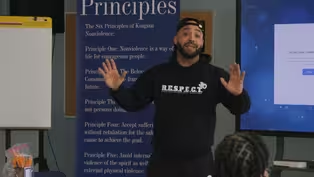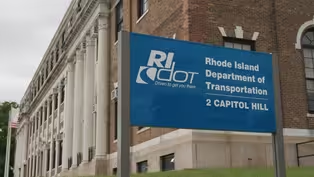
Weekly Insight
Clip: Season 6 Episode 21 | 3m 3sVideo has Closed Captions
Lawmakers have about $65 million more to work with to craft the budget than anticipated.
Primary care and public transportation are among the most expensive issues Rhode Island lawmakers are trying to address. Rhode Island PBS Weekly’s Michelle San Miguel and WPRI 12’s Politics Editor Ted Nesi have the latest on the state’s budget and what lawmakers want to prioritize.
Problems playing video? | Closed Captioning Feedback
Problems playing video? | Closed Captioning Feedback
Rhode Island PBS Weekly is a local public television program presented by Ocean State Media

Weekly Insight
Clip: Season 6 Episode 21 | 3m 3sVideo has Closed Captions
Primary care and public transportation are among the most expensive issues Rhode Island lawmakers are trying to address. Rhode Island PBS Weekly’s Michelle San Miguel and WPRI 12’s Politics Editor Ted Nesi have the latest on the state’s budget and what lawmakers want to prioritize.
Problems playing video? | Closed Captioning Feedback
How to Watch Rhode Island PBS Weekly
Rhode Island PBS Weekly is available to stream on pbs.org and the free PBS App, available on iPhone, Apple TV, Android TV, Android smartphones, Amazon Fire TV, Amazon Fire Tablet, Roku, Samsung Smart TV, and Vizio.
Providing Support for PBS.org
Learn Moreabout PBS online sponsorship- Ted, welcome back.
We're getting a better sense of Rhode Island's state budget as the General Assembly session winds down, and you have described this as one of the most challenging budget environments in years for lawmakers.
How so?
- Yes, and they've been saying it themselves, especially House Speaker Joe Shekarchi.
It's basically for one big reason, Michelle.
The federal money that was provided either to help directly with the pandemic or relief money to recover from the pandemic is, I shouldn't say gone, 'cause some of it hasn't been fully spent yet, but it's been allocated.
There's not more money coming in.
And so the state is kind of back to budgeting, living within its means from the pre-COVID days, and that's a challenge.
- So this can get pretty wonky for those of us who are not Ted Nesi, who don't follow the minutiae of the budget, but the reason this time of year is important for the budget is because final revenue estimates are finally in.
- Right.
These are so important, Michelle, to understanding the budget process.
So every November and every May, the state's number crunchers, they sit in a room, and they determine, down to the penny, how much money the state is going to have that the lawmakers can allocate in the next budget.
They just did this, and they came up with $65 million extra beyond what we were expecting in the governor's budget back in January.
- And that's not a huge amount of money.
I mean, it sounds like a lot of money, but you're saying it's not that big because we're talking grand total, a $14 billion budget.
- Well, that's exactly it, right?
You and I would love $65 million, right?
- Yes.
(laughs) - But when you have $14 billion and a lot of needs, it's not that much money, plus, Michelle, there's other factors going on at the same time.
So updated school enrollment data shows they need to spend about $20 million more to fund the school funding formula.
Union contracts came in higher than expected.
They need about $15 million more to cover those.
That's half the $65 million already before we get to any other asks anybody has.
- Right, and we all know that there are advocates pushing for the issues that they would like to see funded.
Where does that stand?
- Well, one, I have a close eye on, Michelle, is RIPTA, their public transit agency because they have a very big deficit, tens of millions of dollars last time I checked.
If lawmakers want to do something substantial to help them, they need a lot of money for that.
Healthcare, you and I have been talking about that a lot on this segment.
The hospitals have asked for $90 million, a big ask.
There's also asks for increases to doctor rates.
Some of that could be separate, but that would be another expensive fix.
And then they don't necessarily want to do everything Governor McKee proposed to close the deficit back in January, like a new tax on digital advertising.
So if you take that out, the hole gets even bigger.
- And this is part of why we're seeing this push to raise taxes on the higher-income Rhode Islanders.
- Yes, and we've had that as a perennial conversation, Michelle, in Rhode Island, but what's different right now is the new Senate leadership since the death of Dominick Ruggerio.
So Senate President Val Lawson and majority leader Frank Chacon, they both are supportive historically of raising taxes on upper income earners.
Ruggerio was not.
Now, the governor and the house speaker are pretty cool to that idea, so it's not clear to me it's actually gonna make it into the budget, but it is a change to have one of those, the three main parties in these budget negotiations, actually supporting a tax increase, and they might get a little more of a hearing in this budget environment.
- Good to see you.
Thank you, Ted.
- Good to be here.
Video has Closed Captions
Clip: S6 Ep21 | 9m 54s | Report on how violence affects the mental health of young people. (9m 54s)
Video has Closed Captions
Clip: S6 Ep21 | 11m 40s | Engineers say technology could have provided necessary insight years earlier. (11m 40s)
Providing Support for PBS.org
Learn Moreabout PBS online sponsorship
- News and Public Affairs

Top journalists deliver compelling original analysis of the hour's headlines.

- News and Public Affairs

FRONTLINE is investigative journalism that questions, explains and changes our world.












Support for PBS provided by:
Rhode Island PBS Weekly is a local public television program presented by Ocean State Media

